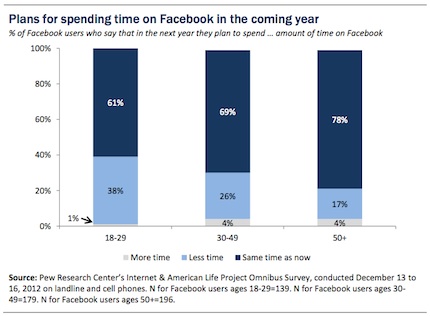Social Media | Research
College-Age Americans Planning To Use Facebook Less
Younger Americans may be losing interest in Facebook. According to new research out of the Pew Internet & American Life Project, a significant chunk of the population aged 18 to 29 reported they're planning to use Facebook less in the next year, while a tiny minority said they plan to use it more.
The report, "Coming and Going on Facebook," found that among Facebook users in the typical college age bracket of 18 to 29, 61 percent reported they will continue to use Facebook as much as they do right now in the coming year. Just 1 percent said they will use it more. And 38 percent said they will use it less.
On top of that, 42 percent of those surveyed in the 18-to-29 age bracket reported that they had already begun using Facebook less often on a daily basis over the course of the last year. For context, a separate report from Pew published in November showed that an increasing number of social media users were accessing various services multiple times per day--41 percent in 2012 versus 33 percent in 2011. "On a typical day nearly half of all adult Internet users access a social networking site," according to the report.
Among older adults, 26 percent of users aged 30 to 49 and 17 percent of users aged 50 or older reported they will use Facebook less often in the coming year. Four percent of those aged 30 or older said they plan to use Facebook more often in the coming year.
So younger users are begging off Facebook in greater numbers than older users--assuming they actually follow through with their plans. That's significant because, according to the report, "Young adults are the most likely forecasters of decreased engagement."

Among the entire population, the study found that 67 percent of all American adults are using Facebook. Of those, 61 percent reported they have taken lengthy breaks from using the service (lasting multiple weeks). Of the 33 percent who do not use Facebook currently, 20 percent reported that they had been users in the past.
Among those who've taken lengthy breaks from Facebook, the top-10 reasons reported included:
- Lack of time or too busy (20 percent);
- Lack of interest or enthusiasm (10 percent);
- Lack of relevance or a waste of time (10 percent);
- "Too much drama/gossip/negativity/conflict" (9 percent);
- Feeling of spending too much time using the service (8 percent);
- Was an infrequent or irregular user to begin with (8 percent);
- Vacation or other travel, including military deployment (8 percent);
- "Just got tired/bored with it" (7 percent);
- No particular reason (6 percent); and
- Various issues with privacy, security, advertisements, and spam.
"These data show that people are trying to make new calibrations in their life to accommodate new social tools," said Lee Rainie, director of the Pew Internet Project and a co-author of the new report, in an e-mail to Campus Technology. "For some, the central calculation is how they spend their time. For others, it's more of a social reckoning as they ask themselves, 'What are my friends doing and thinking and how much does that matter to me?' They are adding up the pluses and minuses on a kind of networking balance sheet and they are trying to figure out how much they get out of connectivity vs. how much they put into it."
The report, "Coming and Going on Facebook," was conducted in December among 1,006 adults living in the continental United States. The complete report, including methodology, is freely available on the Pew Internet and American Life Project site.

